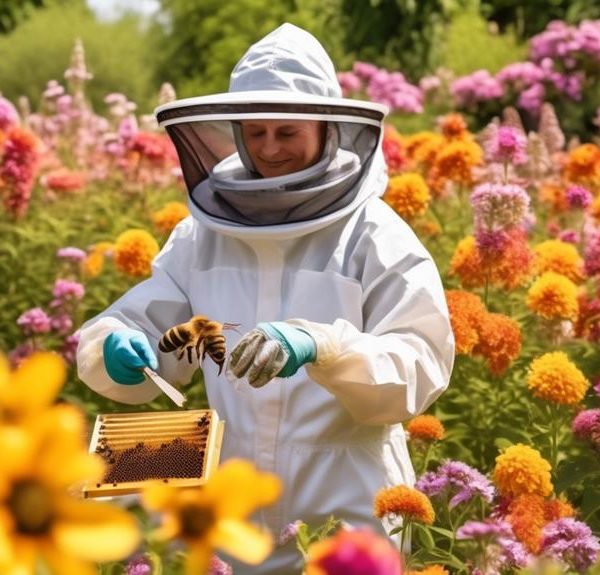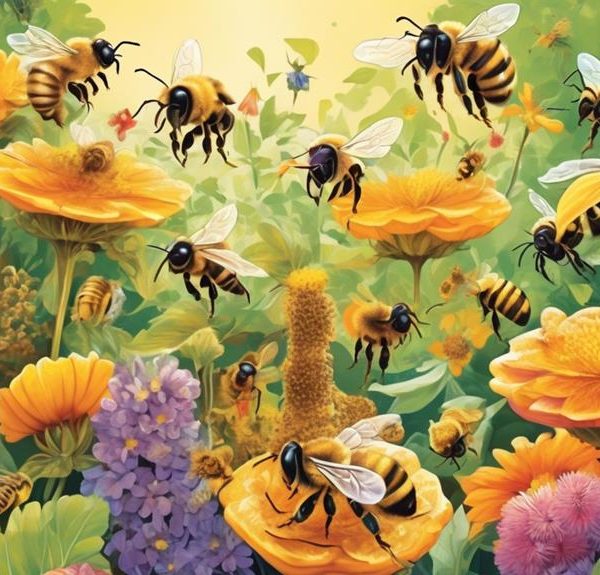Immerse yourself in the intriguing symbiosis between bees and sunflowers, a relationship flourishing with mutual benefits and fascinating secrets waiting to be unfurled.
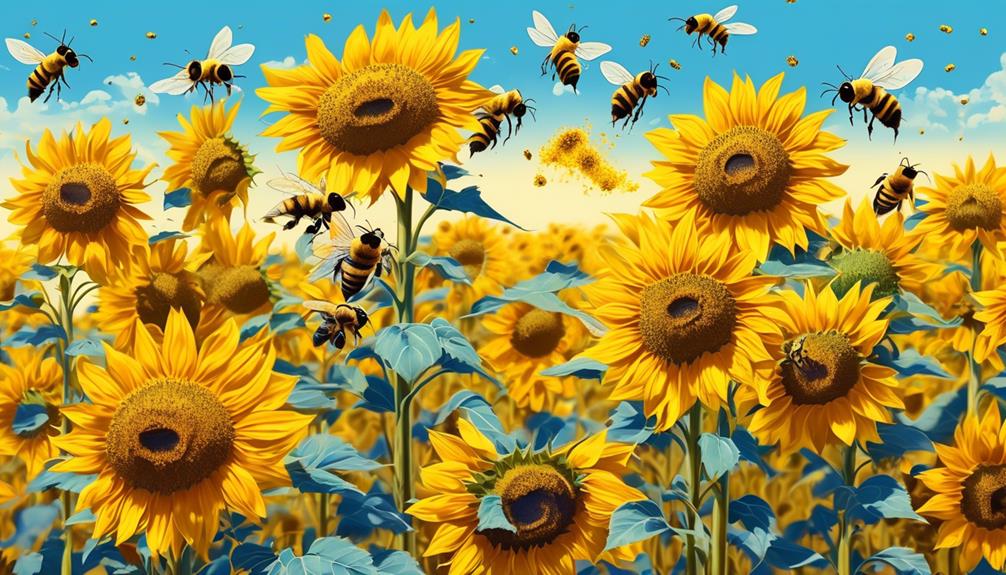
What Bees Like Sunflower Seeds?
You've often heard the saying 'bees to a honeypot,' but have you ever considered the relationship between bees and sunflowers? As an enthusiast of the natural world, you might wonder what draws these buzzing creatures to the towering sunflowers that dot our landscapes.
It's not just about the vibrant yellow petals that seem to wave their hello to the sky. There's a deeper connection here, a symbiotic relationship that's as nourishing as it is fascinating.
But what exactly does the humble sunflower offer to our industrious bee friends? Well, I'm afraid you'll have to stick around a little longer to uncover that.
Key Takeaways
- Sunflowers provide bees with an ideal landing platform and abundant nectar, attracting them as pollinators.
- Sunflower pollen is rich in proteins and lipids, providing essential nutrients for bee larvae development and overall survival.
- Bees play a crucial role in the reproduction of sunflowers through cross-pollination.
- Encouraging sunflower gardens can foster bee populations, promote biodiversity, and improve food diversity and security.
Understanding Bee Attraction to Sunflowers
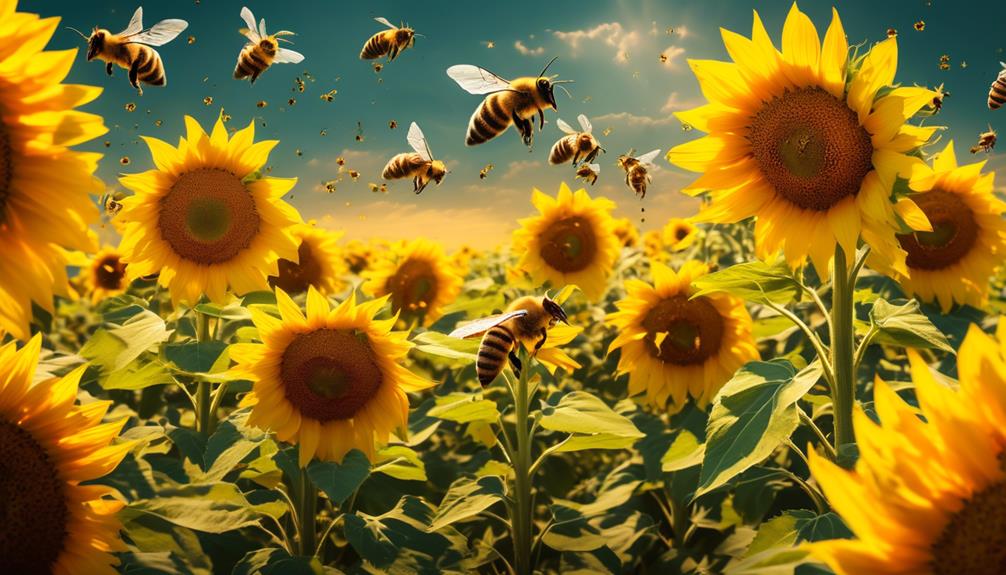
To understand why bees are particularly attracted to sunflowers, it's crucial to delve into the biological and ecological aspects that draw these pollinators to these vibrant blossoms. You see, sunflowers, especially the giant types, are rich in pollen, a bee's primary protein source. Sunflowers' large, flat faces and abundant nectar provide a giant landing platform with plenty of rewards, making them irresistible to bees.
Now, consider the bee's perspective. Visual cues are vital in their foraging activity. Sunflowers, with their vibrant yellow petals and dark centers, provide a stark contrast that's easily visible to bees. Moreover, sunflowers have a unique feature: they're heliotropic, meaning they follow the sun. This movement maximizes their exposure to sunlight, increasing their temperature. Bees are ectothermic; they rely on environmental heat sources. A sunflower in full sun can provide the warmth that bees need for flight.
Furthermore, sunflowers are single-pollinated. Each flower only contains one type of pollen, simplifying collection for bees. So, it's not just about the beauty of sunflowers, but how their unique features cater to bees' biological needs that makes them a favorite among these pollinators.
Nutritional Benefits for Bees
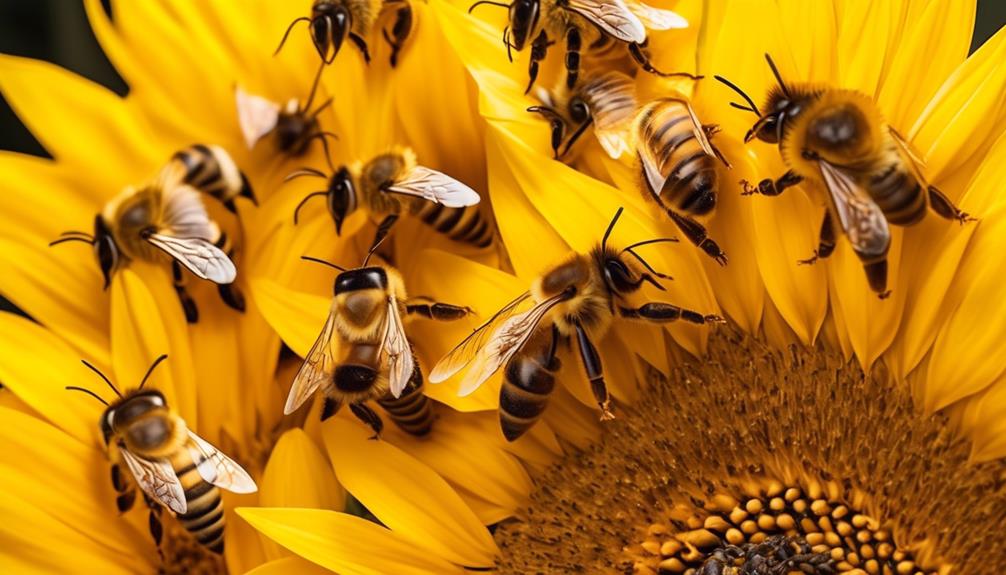
While sunflowers' unique features certainly cater to the bees' physical and environmental needs, they also provide substantial nutritional benefits that sustain the bees' health and vitality. Sunflower pollen is rich in proteins and lipids, essential components in a bee's diet. The high protein content aids in the development of bee larvae, ensuring the continuation of the hive. Similarly, lipids are vital for the bees' energy needs and overall survival.
You see, bees derive essential amino acids from pollen, which are indispensable for their growth and reproduction. Without these nutrients, the bees' immune systems can weaken, leading to a decrease in population. The high-quality pollen from sunflowers, therefore, plays a crucial role in bee sustenance and the overall health of the hive.
Moreover, sunflower nectar is a source of carbohydrates, providing bees with the energy they need for their daily tasks. The nectar's sugar content varies depending on the sunflower variety, offering bees a diverse diet. This variation supports the bees' dietary needs and promotes a robust and resilient hive.
How Bees Pollinate Sunflowers
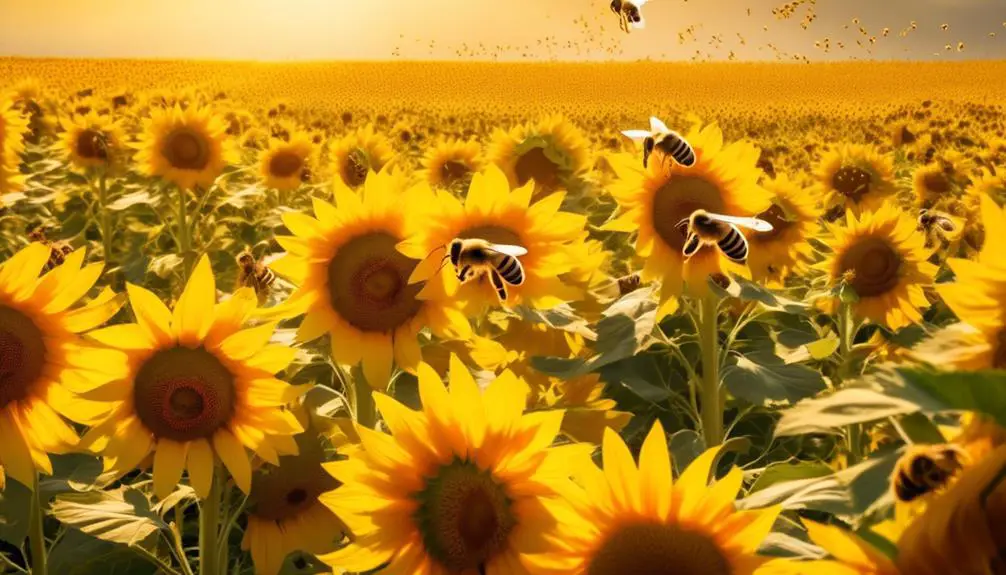
Before diving into the intricate process of pollination, it's essential to understand that bees play a pivotal role in the reproduction of sunflowers. As you watch a bee land on a sunflower, notice how it's not just flitting around aimlessly. It's hard at work, gathering nectar and pollen, two essential ingredients for its diet.
Let's examine this process more closely. When the bee lands on the sunflower, it's drawn to the nectar at the base of the petals. As it buzzes around, collecting the sweet liquid, pollen from the male parts of the flower, known as stamens, sticks to the bee's fuzzy body. When the bee moves to the next flower, some of the pollen rubs off onto the female parts, or pistils, of the new flower. This is called cross-pollination, and it's crucial for the reproduction of the flower.
Without bees, sunflowers would struggle to reproduce, as wind pollination is much less effective. So, next time you admire a field of sunflowers, remember the hard-working bees that helped them bloom. Their industrious actions are a beautiful example of how interconnected our natural world truly is.
Impact on Ecosystem and Agriculture
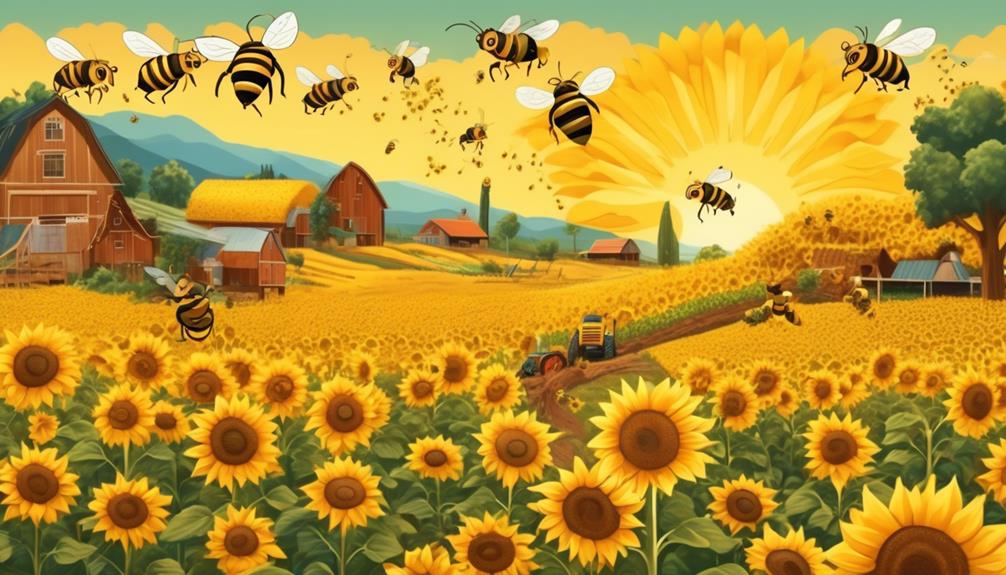
You mightn't know it, but the symbiotic relationship between bees and sunflowers significantly impacts both our ecosystem and our agricultural practices. Bees, acting as pollinators, play a crucial role in the lifecycle of sunflowers. They transfer pollen from one flower to another, enabling fertilization and seed production. This process isn't just beneficial for the plant; it's essential for our food supply.
When bees pollinate sunflowers, they're not only aiding in the production of seeds, which are a valuable food source for many animals, including humans. They're also contributing to the diversity of plant species. This biodiversity is paramount for the health of our ecosystems, promoting resilience and adaptability.
Moreover, sunflower fields attract bees, which in turn helps to boost their population. This is particularly important given the current global decline in bee populations. A healthy bee population has a positive domino effect on the ecosystem. It improves the productivity of other crops, leading to an increase in food diversity and security.
Therefore, encouraging the symbiotic relationship between bees and sunflowers isn't just about preserving a beautiful sight; it's about safeguarding our food future.
Encouraging Bees With Sunflower Gardens
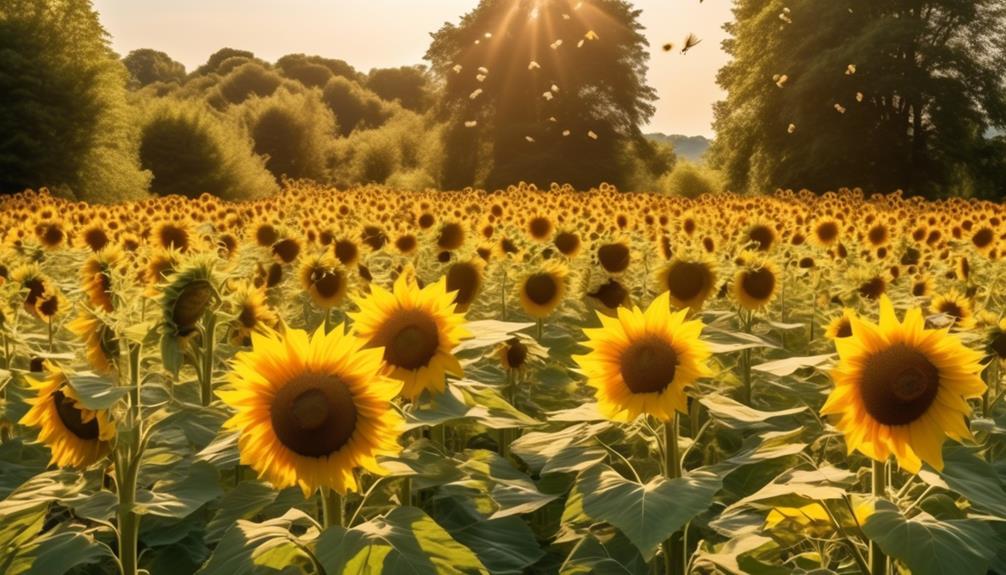
Planting sunflower gardens in your backyard can provide an inviting habitat for bees, thereby fostering their population and promoting biodiversity. By doing so, you're not only enhancing the aesthetic appeal of your outdoor space, but you're also contributing to a vital ecological process: pollination.
Sunflowers, with their large, vibrant heads, are rich in nectar and pollen. These are primary food sources for bees. In fact, sunflowers are one of the most bee-friendly plants you can grow. They attract a variety of bee species, including honeybees, bumblebees, and solitary bees.
To maximize the impact of your sunflower garden, consider planting different sunflower varieties. Some bees, like the honeybee, prefer the pollen from single-petal varieties, while others are attracted to multi-petal types. Also, staggering the planting times can ensure a continuous bloom, providing bees with a stable food source.
Frequently Asked Questions
How Do Sunflower Seeds Affect the Lifespan of Bees?
Sunflower seeds don't directly affect a bee's lifespan. However, sunflowers are a rich source of pollen and nectar, which bees need for survival. When you plant sunflowers, you're providing essential nutrients that help bees thrive.
Can Bees Be Allergic to Sunflower Seeds?
No, bees can't be allergic to sunflower seeds. Bees don't have the same immune response as humans, so they don't experience allergies in the way we do.
They're drawn to sunflowers for their pollen and nectar, not the seeds. However, pesticides on the seeds could harm them. It's important to protect bees by choosing organic seeds and plants.
What Are the Potential Dangers to Bees From Consuming Sunflower Seeds?
You're curious about the possible risks to bees from eating sunflower seeds.
While bees aren't typically seed eaters, they could ingest some while gathering pollen.
There's little research on this, but potential issues could stem from the hard shell, which they can't digest.
Also, if the seeds are treated with pesticides, it could harm the bees.
It's a fascinating topic, but more studies need to be conducted to provide a definitive answer.
How Does the Taste of Sunflower Seeds Affect a Bee's Preference for It?
You're wondering how the taste of sunflower seeds impacts a bee's preference for it.
While bees don't taste food the same way humans do, they do respond to certain flavors.
Sunflower seeds, particularly their pollen, offer a unique taste that could be attractive to bees.
However, it's more about the nutritional value these seeds provide rather than taste alone.
The protein-rich pollen in sunflower seeds is often what truly draws bees in.
Can Sunflower Seeds Be Used in Beekeeping Practices to Attract More Bees?
You certainly can use sunflower seeds in your beekeeping practices to attract more bees. Bees are attracted to sunflowers due to their high pollen content.
However, it's not the seeds that attract them, but the sunflower's vibrant yellow petals and the nectar within.
Conclusion
So, you see, bees are drawn to sunflowers not just for their vibrant color and sweet nectar, but also for the rich cache of nutrients they provide.
These buzzing pollinators play a vital role in sunflower pollination, impacting both our ecosystem and agriculture.
By planting sunflower gardens, you're not only creating a feast for bees but also contributing to a healthier and more balanced environment.
Indeed, this interplay between bees and sunflowers is a marvel of nature.

